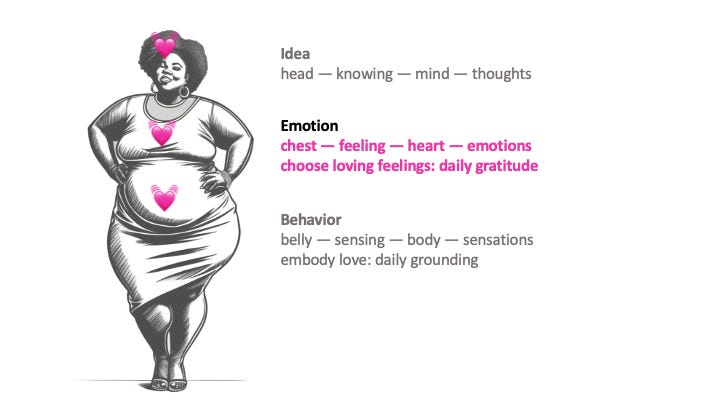
🎧 Listen to the Essay and/or Meditation 🎧
Why, yes, those are 2 separate audio links – 1 below, 1 above. || My reading of this essay is right before the opening Hi friends. 👇🏾 || A guided meditation is at the top of this email. 👆🏾 || An archive of meditations lives here.
Listen to me read this essay:
This is the third in a 4-part series based on my online course, Love Club. You can find all posts here.
Hi friends
The third week of May in New York City (a city designated as a humid subtropical climate), the temperature repeatedly dropped down to the forties and the heat in my building came on. 😭WHY?? [I know why, and it’s heartbreaking. 😭]
Welcome. And thank you for being here. It’s taken me a while to shape this essay. I like to begin writing at least 72 hours before a lunation. But, this time, on the particular day I blocked to start, I woke up with an achy body. Nothing like the previous months, yet enough to activate frustration and eventually hot tears that sent me to the bathtub (where I did some writing in my head but mostly daydreamed). This week was also a tests & scans week for me. They revealed some good news and some not so good news. I say this because I want to normalize how hard things may feel for any of us.
For me, “hard” mostly involves illness and physical pain. However, by any afternoon (No News Before Noon!), the horrors of the world get mixed in. How could they not? The more I can let myself feel, the more I do feel. Right now I feel fed up with physical, emotional and mental pain—personal and collective. Then I remind myself to allow these emotions, to sense them in my body, and to greet them with kindness. In this way, I slow the roll on added suffering. Loving presence allows me to stop spinning out scary stories, to return to this moment of breath, to uncover grace and gratitude for my precious life. Sobbing to friends and getting hugs help too.
My lovely friends, La & Fran, have been leading a weekly online session where we chant the Buddhist five remembrances which are meant to be recollected daily as reminders that pain is not punishment because aging, sickness, and loss are part of the deal. These statements remind us that not a single one of us gets out of here alive and that however we choose to act within these truths will have an effect. They go like this:
I am of the nature to grow old. I have not gone beyond aging.
I am of the nature to be ill. I have not gone beyond illness.
I am of the nature to die. I have not gone beyond death.
All that is mine, beloved and pleasing, will change and vanish.
I am the owner of my actions, heir to my actions, born of my actions, related to my actions, supported by my actions. Whatever actions I do, whether wise or unwise, of that I shall be the heir.
It cannot be said enough: It’s okay to feel not-okay. Especially right now. No matter how you’re feeling in this moment, please be kind and generous with yourself. Thanks again for being here with me.
We’ve reached the third installment of Love Club. Each time, we explore one statement from bell hooks’ All About Love and map it to one of the three intelligence centers based on the Enneagram. Last time, we sensed the root intelligence of embodiment by grounding in love through the belly. Today we focus on the heart center, our emotions, and the practice of choosing loving feelings.

This week, we ponder the following sentence from hooks:
“Knowing how to be solitary is central to the art of loving.” — bell hooks, All About Love
In this culture, solitude and loneliness often get conflated. Yet most of us benefit from the creative energy generated by being alone. Of course, there’s an epidemic of loneliness and an epic loss of community across the western world and beyond. So, I say “being alone” in the context of a healthy relationship to ourselves and others. You know, the best of autonomy. And, yes, that is extremely not easy. Particularly for those of us (just me?) raised by emotionally immature adults who tragically lost their own connection to land and culture leading their children to grasp for survival and/or success through consumption and competition. You know, the worst of modernity.
Loneliness does hurt. Brain imaging studies show that feeling ostracized actually activates our neural pain matrix. Though I don’t want more pain, I sometimes find myself perpetuating loneliness by further isolating. As someone who needs regular and massive amounts of time by myself to feel like myself, I practice clocking when “my solitude” is disconnection masquerading as introversion. I do not blame myself for separating and disassociating. Those were once good strategies. They are not solutions for the delusion of separation. As a grown-ass immigrant Black lady and fellow Earthling, it is my responsibility to continuously and wholeheartedly (re)attempt connection in ways that make sense in the context of my current life. I do so even when it’s inevitably awkward or bumpy or messy—with a ginormous caveat for boundaries. I do so even though I question what even is “community” with so much family fracture, when so many of my relationships are one-to-one (taking me years to introduce some of my besties to some of my other besties), where all this gets exacerbated by differing geographies or life trajectories, when sometimes it’s easier to retreat into YouTube on my tablet or word games on my phone.
I cannot untangle here the who, what, or why of how we’ve confused the solipsism of separation for the sovereignty of solitude. Though, I believe we witness that confusion in record levels of social anxiety and social isolation. I take comfort that my tenderly human longing for communion inspires me to keep seeking it. This year, my 70+ unit building revived our Tenant Association, spearheaded by some lovely and quite energetic millenials (I sort of remember having that much energy). It’s been a delight to meet neighbors and gather in each other’s apartments to discuss how we can both advocate for better care for our shared home and create ways to celebrate together. We need each other, all of us.
Still, the pain of loneliness can occur in the midst of community, within a loving marriage, surrounded by people while the glory of solitude can be enjoyed side-by-side with others. When I was younger (i.e. last year), I had trouble distinguishing between true loneliness and the habit to label solitude as bad. This is not unrelated to our previous exploration on the elevation of coupledom. The fusion of loneliness and solitude makes its way into negative messages about being single. Psychologist and researcher, Bella DePaulo1, reanalyzed that data of more than eight hundred different academic studies carried out over the last thirty years that mention single people. These studies originally concluded that single people have worse health outcomes and suffer from loneliness. But, upon reexamination, DePaula found faulty data. In fact, most of the results are exactly the opposite of what we’ve been led to believe. Married people experience psyhcic boosts from the positive perceptions of coupledom. Single people suffer deprecation from the perceptions of solitude. But these perceptions do not correlate with the truth of people’s lives. In fact, single people have a heightened sense of self-determination and are more likely to experience continued growth and development. Overall, single people are less insular than married people and, thus, more connected.
Once again, I am not trying to critique coupling or marriage. Actually, I am wondering what wisdom all of us may glean from those who have boldly and intimately explored solitude without sacrificing connection. For me, artists of all types inform this inquiry: word weavers, image designers, object shapers, experience makers, world builders. Creators consciously and consistently make sacred space to pause and go within, to listen and respond, to express and inspire. Even in collaborations, each person emits an authentic expression which can only be forged within their own heart. From artists, I learn that I must practice solitude every time I begin one of these newsletters (even though it always feels like I’m restarting the intro-101-basic-ABC’s of what they teach). What am I even sensing/feeling/knowing? How do I communicate it? How do I express authentically and also make any damn sense to others? Why am I even doing this?
Actually, I know why I do this. I do this to (say it with me) remind me to love. I go within in order to connect with my own feelings: pleasant and unpleasant, mature and immature. I write to understand solitude for myself. I write to remember the quite ordinary, human nature of the suffering on any path to awakening: pain, tears, loneliness, separation. I write to remember the fruits of this path: hugs, beauty, wonder, freedom. I write this for anyone who resonates… Welcome. We need each other, all of us.
Mystics are the other artists of solitude. They too invite interconnection by going within. Here, I return to 14th century badass Saint Catherine of Siena who, as a girl, felt called to God and dedicated herself to the sacred. When her family resisted her longing, she cut off her hair, refused food and retreated to her room to pray. Finally becoming a nun, she was deeply devoted to the divine through her own private practice, experiencing profound intuitions, visions, and insights. However, she refused to become a cloistered, veil-wearing nun. She joined an order that encouraged engagement in the world. She became a prolific writer as well as an influential activist advocating for peace in times of war by advising popes and other church leaders. She also dropped this truth bomb which I shared last time:
“All has been consecrated. The creatures in the forest know this, the earth does, the seas do, the clouds know, as does the heart full of love. Strange! A priest would rob us of this knowledge and then empower himself with the ability to make holy what already was.” — St. Catherine of Siena
And I emphasize again: The heart full of love knows that everything is holy. Solitude reminds me to love everyone and everything as holy because it provides time and space for me to feel my own heart.
There’s always so much more to say. And this is what I found within my heart today. Thank you for receiving it. I’m grateful for your presence. I wish you grace in solitude and joy in communion (and visa versa).
With love,
Sebene
JOURNAL PROMPTS:
Focusing on your feelings, reflect on what ways you experience being solitary as central to the art of loving and in what ways you do NOT experience being solitary as central to the art of loving.
What are ways you distract yourself from feelings of loneliness?
What are ways you resist connection?
ONGOING PRACTICES:
Continue with anything that resonates (singing love songs to yourself, writing letters from love, exploring your centers of intelligence).
Begin or continue a gratitude practice. Make a daily written list of 3 things for which you are grateful – allowing yourself to feel the appreciation fully.
Center sacred solitude to write a poem (or paint a picture or sing a song or do anything creative!!). Set aside some space and time. With awareness, appreciation, and gratitude -- create.
Explore meditative and/or contemplative practices that support awareness of the heart center/emotions (metta, self-compassion, RAIN). Explore what it means to feel love.
https://belladepaulo.com











Share this post